Francis Berger's Blog, page 178
February 15, 2017
A Picture of Mohamed
Yet another brilliant You Tube video by Jordan Peterson.
Published on February 15, 2017 11:31
February 11, 2017
Time To Be Possessed by Demons and Devils
 Very few writers understand the inherent horrors and dangers of ideology as well as Fyodor Dostoevsky. His dark political and social satire Demons, first published in 1871-72, centers around a small town that suffers the rather catastrophic consequences of an attempted revolution. In the novel, Dostoevsky portrays the revolutionaries, who of course see their aims as noble and virtuous, as demons - not in the literal sense, but rather in the sense of being possessed by a demonic power that propels them to commit the most horrific crimes and outrages under the banner of goodness, justice, and humanity. The novel has several different titles in English: The Possessed, The Devils, and Demons. Interestingly enough, each title works because it essentially encapsulates Dostoevsky's profound insight that those that seek to improve the world through the vehicle of ideology end up being consumed by and thus possessed by the ideology, which becomes a satanic force that leads to the destruction of all, including the revolutionaries themselves.
Very few writers understand the inherent horrors and dangers of ideology as well as Fyodor Dostoevsky. His dark political and social satire Demons, first published in 1871-72, centers around a small town that suffers the rather catastrophic consequences of an attempted revolution. In the novel, Dostoevsky portrays the revolutionaries, who of course see their aims as noble and virtuous, as demons - not in the literal sense, but rather in the sense of being possessed by a demonic power that propels them to commit the most horrific crimes and outrages under the banner of goodness, justice, and humanity. The novel has several different titles in English: The Possessed, The Devils, and Demons. Interestingly enough, each title works because it essentially encapsulates Dostoevsky's profound insight that those that seek to improve the world through the vehicle of ideology end up being consumed by and thus possessed by the ideology, which becomes a satanic force that leads to the destruction of all, including the revolutionaries themselves. I read the novel about twenty-five years ago (a beat-up paperback copy titled The Possessed) and I remember being incredibly moved by it. Though I recall the overall plot and some of the characters, my most lasting impression was the tragedy Dostoevsky masterfully invokes as the revolutionaries become possessed by the ideology they wield, the horrible descent that occurs when their ideology poisons their souls leaving them in a desert of political and moral nihilism where violence becomes the only viable solution to the obstacles they face. Put briefly, it is an intense, violent, and deeply-troubling novel that is made all the more profound by its uncanny prophetic vision (remember, the Bolshevik Revolution flared up a mere half-century after Demons was published and Russia eventually became privy to horrors the likes of which the world has rarely seen).
When I look at the world today, I see people from across the political spectrum firmly entrenched in the gutters of ideology. In the West, ideology reigns supreme. Like Dostoevsky's revolutionaries, many of today's ideologues are possessed, beyond the point of no-return. I am wary of these kinds of people and I humbly suggest that you should be wary of them too. I plan to re-read Dostoevsky's masterpiece in the coming weeks; I firmly believe doing so will fortify my sensibilities when it comes to the dangers of ideologies. If you want a better understanding the force that fuels contemporary ideologues, I can offer no better novel and I humbly suggest you allow yourself to be Possessed by Demons or Devils in order to be able to identify and gain a better understanding of the possessed demons and devils that lurk among us. The times may have changed, but the demonic forces behind ideology have not
The book is available free ebook on Project Gutenberg among other sites:
http://www.gutenberg.org/files/8117/8117-h/8117-h.htm
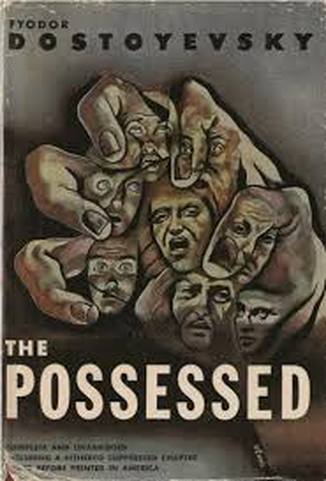
Published on February 11, 2017 10:44
February 5, 2017
Why I Have Not Engaged in Much Platform Building Until Now and Why This Will Change in the Future
With the exception of this website, I have not done much in the way of platform-building. Below I explain the reasons why:
1. Because I worked as a high school teacher, I was not entirely free to put myself out there.
If I had published a book called How To Be A Great Teacher or Fluffy Bunny's ABC Adventures, I would have had no qualms about building an online presence as a writer while I worked as a high school teacher. But I hadn't written a book like that.
I published my novel in 2012, but I continued to work as a high school teacher until March 2015. Though I tackle many themes and subjects in my novel The City of Earthly Desire, a large portion of the narrative focuses on the pornography industry that began to thrive in Budapest immediately after the collapse of communism in Hungary.
Now, as anyone who has read the novel can tell you, it is not a pornographic novel, that it is I did not write it with the sole aim of arousing sexual desire in the reader; on the contrary, the novel is extremely critical of pornography as a pernicious social and soul-corrupting phemonenon. I wrote no explicitly crude sexual scenes, but I admit that some of the content of my novel is, due to the inherent nature of the thing I chose to focus on, vulgar in nature. It would be difficult to provide the reader with a truthful representation of what the porn industry in Budapest was like without including some of the terms and ideas inherent within the porn industry itself. Of course, the novel is not solely about pornography, which I frame as the choice between love and lust, but it does dominate the narrative landscape of the book.
Because I was still working as I high school teacher in 2012, I took a considerable chance when I self-published the novel. In today's hypersensitive education environment, I knew that one vindictive student or curious parent would be all it would take to put my career in jeopardy. Therefore, my promotion of the novel after it appeared on the market was tepid at best. I imposed a sort of censorship upon myself. I had think about the potential consequences of every little thing I did and ensure that anything I put online could not be misconstrued, used against me, or misunderstood. Even so, a couple of students did stumble across my novel or blog from time-to-time, but none of them ever bothered to look into it in any great detail nor notify my higher ups about it, let alone purchase or read it. The only exception to this was the private school prinicipal I worked for in Toronto; a cultured gentleman, he not only purchased the novel and read it, but told me he liked it and left it at that. I doubt I would have been dealt with so mercifully had I worked in the public education sector at the time.
When I went to work in England, I quickly learned that I had to keep my novel off the radar if I wanted to keep my job. I kept my blogging and online activities to a bare minimum in order to avoid accidental detection by the administration or students because I knew that if I was discovered there, I would have been drawn and quartered without a second thought. In the end, it was a good experience because it finally inspired me to get out of teaching high school and do something where I had more control of my life. I quit my job in England a mere eight months after I had accepted it and took a university instructor position in Sopron, Hungary instead.
Since I am no longer working as a high school teacher, I no longer feel constrained or compromised about my novel or my activities as a writer. In fact, I have doggedly focused on manifesting the kind of circumstances where I can be myself, speak freely, and promote my work as I desire without the fear of losing my job. I have also attained enough financial security to be able to withstand the possible loss of a job. The work I do outside of writing is no longer a potential noose around my neck.
2. I could not engage in the most effective platform building activities
Even in 2012, I knew YouTube was the way to go, but for all the reasons I have mentioned above, I could not engage in promoting the book through YouTube when I was a teacher.
3. I had to be careful on Facebook and Twitter
Again, the teacher thing. Then, in 2015, I quit Facebook and Twitter altogether for personal and political reasons. I will not return to Facebook or Twitter in the future even though I know they can serve as useful platform-building tools.
4. I focused on my family
My son was born six months before I published my novel. Being a writer is important to me, but being a father is infinitely more important.
5. I was happy and am happy still
I'll be honest. I always was, and continue to be fairly apprehensive about putting myself out there in terms of presence. I am a fairly private individual by nature and I am not inspired by dreams of fame; I simply would like to reach a wider readership. Unfortunately, I do not how I can build a readership without putting my face and body out there. A book on the market is not enough these days. Nor are positive reviews or mere presence on a blog or on sites like Goodreads. So if I want more people to read my book, I have to be more visible. Here's the catch - I am happy about my life now, and though I would welcome a wider readership, I am still wary about the extra attention it may bring.
Well, having said all that all, buidling, or rather, expanding my platform is now a primary goal and I am currently focusing on this endeavor. Stay tuned.
1. Because I worked as a high school teacher, I was not entirely free to put myself out there.
If I had published a book called How To Be A Great Teacher or Fluffy Bunny's ABC Adventures, I would have had no qualms about building an online presence as a writer while I worked as a high school teacher. But I hadn't written a book like that.
I published my novel in 2012, but I continued to work as a high school teacher until March 2015. Though I tackle many themes and subjects in my novel The City of Earthly Desire, a large portion of the narrative focuses on the pornography industry that began to thrive in Budapest immediately after the collapse of communism in Hungary.
Now, as anyone who has read the novel can tell you, it is not a pornographic novel, that it is I did not write it with the sole aim of arousing sexual desire in the reader; on the contrary, the novel is extremely critical of pornography as a pernicious social and soul-corrupting phemonenon. I wrote no explicitly crude sexual scenes, but I admit that some of the content of my novel is, due to the inherent nature of the thing I chose to focus on, vulgar in nature. It would be difficult to provide the reader with a truthful representation of what the porn industry in Budapest was like without including some of the terms and ideas inherent within the porn industry itself. Of course, the novel is not solely about pornography, which I frame as the choice between love and lust, but it does dominate the narrative landscape of the book.
Because I was still working as I high school teacher in 2012, I took a considerable chance when I self-published the novel. In today's hypersensitive education environment, I knew that one vindictive student or curious parent would be all it would take to put my career in jeopardy. Therefore, my promotion of the novel after it appeared on the market was tepid at best. I imposed a sort of censorship upon myself. I had think about the potential consequences of every little thing I did and ensure that anything I put online could not be misconstrued, used against me, or misunderstood. Even so, a couple of students did stumble across my novel or blog from time-to-time, but none of them ever bothered to look into it in any great detail nor notify my higher ups about it, let alone purchase or read it. The only exception to this was the private school prinicipal I worked for in Toronto; a cultured gentleman, he not only purchased the novel and read it, but told me he liked it and left it at that. I doubt I would have been dealt with so mercifully had I worked in the public education sector at the time.
When I went to work in England, I quickly learned that I had to keep my novel off the radar if I wanted to keep my job. I kept my blogging and online activities to a bare minimum in order to avoid accidental detection by the administration or students because I knew that if I was discovered there, I would have been drawn and quartered without a second thought. In the end, it was a good experience because it finally inspired me to get out of teaching high school and do something where I had more control of my life. I quit my job in England a mere eight months after I had accepted it and took a university instructor position in Sopron, Hungary instead.
Since I am no longer working as a high school teacher, I no longer feel constrained or compromised about my novel or my activities as a writer. In fact, I have doggedly focused on manifesting the kind of circumstances where I can be myself, speak freely, and promote my work as I desire without the fear of losing my job. I have also attained enough financial security to be able to withstand the possible loss of a job. The work I do outside of writing is no longer a potential noose around my neck.
2. I could not engage in the most effective platform building activities
Even in 2012, I knew YouTube was the way to go, but for all the reasons I have mentioned above, I could not engage in promoting the book through YouTube when I was a teacher.
3. I had to be careful on Facebook and Twitter
Again, the teacher thing. Then, in 2015, I quit Facebook and Twitter altogether for personal and political reasons. I will not return to Facebook or Twitter in the future even though I know they can serve as useful platform-building tools.
4. I focused on my family
My son was born six months before I published my novel. Being a writer is important to me, but being a father is infinitely more important.
5. I was happy and am happy still
I'll be honest. I always was, and continue to be fairly apprehensive about putting myself out there in terms of presence. I am a fairly private individual by nature and I am not inspired by dreams of fame; I simply would like to reach a wider readership. Unfortunately, I do not how I can build a readership without putting my face and body out there. A book on the market is not enough these days. Nor are positive reviews or mere presence on a blog or on sites like Goodreads. So if I want more people to read my book, I have to be more visible. Here's the catch - I am happy about my life now, and though I would welcome a wider readership, I am still wary about the extra attention it may bring.
Well, having said all that all, buidling, or rather, expanding my platform is now a primary goal and I am currently focusing on this endeavor. Stay tuned.
Published on February 05, 2017 07:03
February 3, 2017
This Gender Pronoun Thing is Going to Make Writing Novels a Real Bitch
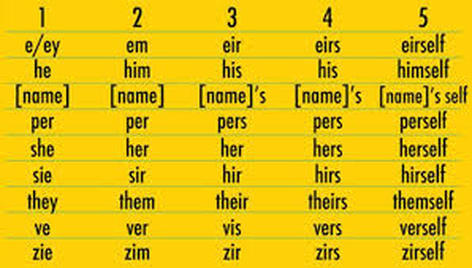 Like I don't have enough to worry about when it comes to proofreading and revision, now I have to agonize over which of the 30? 70? gender pronouns to use when I write my stories, too?
Like I don't have enough to worry about when it comes to proofreading and revision, now I have to agonize over which of the 30? 70? gender pronouns to use when I write my stories, too?And what happens if one of my characters decides to go all gender-fluid on me in Chapter 2 and I forget to use the appropriate pronoun in Chapter 8? Will he or she (is he or she even correct here?) have the right to file human rights violation complaints or hate crime charges against me for my wanton act of authorly bigotry?
I had a tough enough time with the whole "he/she" thing in sentences like "If a student is late for class, he or she must sign the late sheet." What the heck do I write now? "If a student is late for class, he or she or they or zhir or do re mi fa so la tee doh, or elfkin, or bearspirit must sign the late sheet."
But the people I feel really sorry are the hacks who write porn and erotica. I mean, I'm going to have a tough time using the right pronouns in my own work should I choose to include a non-binary gender character in one of my stories, but gosh, I feel sorry for those sonsabitches that make a living writing porn. They got their work cut out for them.
Imagine having to write a massive group sex orgy scene involving 3 cisgender females, 2 cisgender males, an agender, 2 bigenders, an MTF, 7 or 8 genderqueers, 1 intersex, 6 neutroises, a non-binary, 4 pangenders, 12 transexuals, a couple of two-spririts, 12 drummers drumming, 11 pipers piping, 10 lords-a-leaping, 9 ladies dancing, 8 maids-a-milking, 4 drag kings, 2 genderblenders, and a really irritable butch named Bob.
Come to think it, imagine having to read it . . .
Published on February 03, 2017 20:29
January 31, 2017
If You Want to Make Money Writing Today, Be Sure To Use Generous Portions of the Following Ingredients in Your Work
Published on January 31, 2017 05:48
January 29, 2017
A Few Short Thoughts About Truth: Jordan Peterson
The last point Peterson makes in this short clip will be contentious to most.
Published on January 29, 2017 11:32
Communism Just as Bad as Fascism? Not in the West, it Ain't
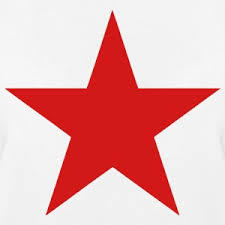 That fascism was and is an inherently evil ideology is accepted without much serious debate in the West. In fact, we have been instructed to believe that fascism, and its nationalist-socialist offspring, are the greatest evils that have ever plagued mankind and the Earth. You will not get much objection from me on this point - I agree, fascism and nazism are inherently evil ideologies that have wreaked great harm upon humanity, and care should be taken to ensure this ideology does not rear its ugly head again in the future.
That fascism was and is an inherently evil ideology is accepted without much serious debate in the West. In fact, we have been instructed to believe that fascism, and its nationalist-socialist offspring, are the greatest evils that have ever plagued mankind and the Earth. You will not get much objection from me on this point - I agree, fascism and nazism are inherently evil ideologies that have wreaked great harm upon humanity, and care should be taken to ensure this ideology does not rear its ugly head again in the future. The horrors of fascism and nazism are well-known, but there is a massive blind spot in the West when it comes to fully acknowledging the horrors of communism. Unlike fascism, communism is not anathema in the West. Despite the efforts of writers like Solzhenitsyn and others, despite extensive historical records and documents, despite countless eye witness accounts and terrifying personal testimony, the terrible legacy of communism has not ignited the same levels of condemnation in the West as fascism has.
On the contrary, many celebrated intellectuals and thinkers were or are professed communists and either enjoyed or continue to enjoy rewarding careers in academia or in the media despite their admiration or support of the Marxist cause. Some, like Slavoj Zizek, have built an entire careers on the foundations of Marxist apologetics and obtuse French Marxist psychoanalysis. You can talk about communism as a viable political option at any Starbucks in the West without drawing too much objection from anyone sitting at nearby tables. The name Stalin does not inspire great same depths of scorn on the facial expressions of most when his name is mentioned. And of course, no hipster wardrobe would be complete without at least a few items of clothing featuring Comrade Lenin, a red star, hammers-and-sickles, or Che Guevara.
This has always bothered me and it continues to bother me, especially now when the West is seized by a collective paranoia over the rise of fascism.
Don't misunderstand. I am no supporter of fascism; I have no crooked cross in my head. The ideology is evil and loathesome. What seems to separate me from so many others is my conviction that communism / Marxism is just as evil and loathesome and deserves to be addressed and treated with the same contempt.
But for the most part it isn't, and it does not seem like it will ever be. A tremendous shortcoming.
Published on January 29, 2017 10:26
January 26, 2017
Post-Modern Aesthetics as a Gauge For Detecting The Quality of the Mind and Spirit
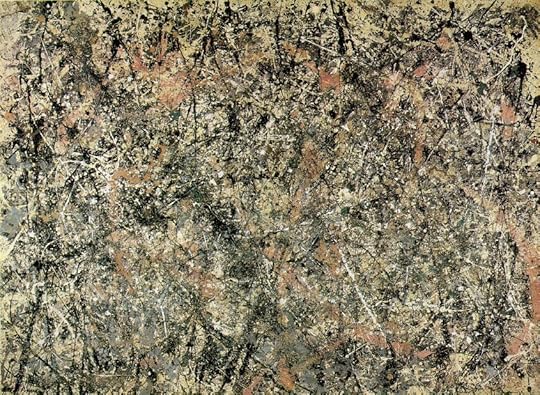 Jackson Polloack: Number One (Lavender Mist) Is it just me, or is there actually not a trace of fucking lavender in this mess? If you experience confusion, revulsion, scorn, or a combination of any or all of the above whenever you see a "masterpiece" like this, don't despair. You are not alone and there is nothing wrong with you. Your not uncultured, or unsophisticated, or uncouth, or unrefined. On the contrary, if you find yourself sneering at post-modern aesthetics in general, regard it as a sure sign of your integrity, health, and sanity.
Jackson Polloack: Number One (Lavender Mist) Is it just me, or is there actually not a trace of fucking lavender in this mess? If you experience confusion, revulsion, scorn, or a combination of any or all of the above whenever you see a "masterpiece" like this, don't despair. You are not alone and there is nothing wrong with you. Your not uncultured, or unsophisticated, or uncouth, or unrefined. On the contrary, if you find yourself sneering at post-modern aesthetics in general, regard it as a sure sign of your integrity, health, and sanity.
Published on January 26, 2017 10:20
January 25, 2017
A Tiny Sliver of My Work is Sure To Last For Posterity
 Statue of István Széchenyi, Sopron, Hungary. Jan. 25, 2017 - This is located a mere stone's throw from my workplace. To commemorate the 225th anniversary Count István Széchenyi's birth, the City of Sopron and a notable local civil organization initiated a plan to engrave one of Széchenyi's patriotic quotes into the pedestal of his statue that stands in the center of town in the aptly named Széchenyi Square.
Statue of István Széchenyi, Sopron, Hungary. Jan. 25, 2017 - This is located a mere stone's throw from my workplace. To commemorate the 225th anniversary Count István Széchenyi's birth, the City of Sopron and a notable local civil organization initiated a plan to engrave one of Széchenyi's patriotic quotes into the pedestal of his statue that stands in the center of town in the aptly named Széchenyi Square.The Hungarian quote was translated into three languages - German, Croation, and English. I was commissioned to do the English translation.
The city had a big unveiling ceremony back in September, but I do to other obligations, I did not have the chance to attend. Though I work a mere two hundred meters from the Széchenyi Square, I did not stop to see the engravings until today.
The engraved letters themselves are marvellous, but to be honest, I am not entirely satisfied with the translation that ended up on the plaque. I find it clunky and wordy. My first translation of the quote, which began with the dependent clause and left the main idea in one unit, was far better, in my opinion, but it was rejected because it did not match the syntactical structure of the original. I was under instruction to remain as faithful to the original Hungarian as possible, both in choice of diction and in terms of syntax. This is the bane of translating - giving a client exactly what they want even if what they want is not the best possible version.
Regardless, I am still proud of my work here; I believe it accurately mirrors both the diction and the tone of the original Hungarian. If nothing else, at least this small piece of my work will remain for posterity.
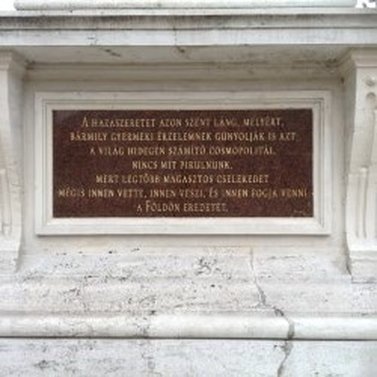 The original Hungarian - „A hazaszeretet azon szent láng, melyért, bármily gyermeki érzelemnek gúnyolják is azt a világ hidegen számító cosmopolitái, nincs mit pirulnunk, mert a legtöbb magasztos cselekedet mégis innen vette, innen veszi, és innen fogja venni a Földön eredetét.”
The original Hungarian - „A hazaszeretet azon szent láng, melyért, bármily gyermeki érzelemnek gúnyolják is azt a világ hidegen számító cosmopolitái, nincs mit pirulnunk, mert a legtöbb magasztos cselekedet mégis innen vette, innen veszi, és innen fogja venni a Földön eredetét.”  The translation - "The love of one's country, even if it is frowned upon as a childish emotion by the cold calculations of the cosmopolitan world, is a sacred flame of which we should not feel ashamed because most of the sublime deeds that were, are, or will be performed on Earth stem from it."
The translation - "The love of one's country, even if it is frowned upon as a childish emotion by the cold calculations of the cosmopolitan world, is a sacred flame of which we should not feel ashamed because most of the sublime deeds that were, are, or will be performed on Earth stem from it."
Published on January 25, 2017 10:49
Stories Are the World of Value and Truth
Over the past few days, I have been spending much time thinking about the debate between Sam Harris and Jordan Peterson. The more I think about it, the more I gravitate toward's Peterson's side of the argument. This is hardly surprising since I more or less hold similar views concerning the nature of truth and have held these views for many years.
I touch upon the truth contained in stories in my novel The City of Earthly Desire. Toward the end of the novel, a young woman named Brigitta describes the legend of the white stag to the protagonist, Béla. A student of history, Brigitta is interested in the kinds of evidence and hard scientific fact Sam Harris expounds during his debate with Jordan Peterson, but she sees their limits when seen in a larger context of value and truth. After finishing describing the legend of the white stag, she states:
“Of course, it’s all nonsense, historically speaking, but that doesn’t make it untrue. Though I would never admit this to any historian, I have found legends and myths reveal more about a culture than cold, hard facts do.”
I discovered a direct connection to this line of thinking in Jordan Peterson's work a few days ago. On his website, he states:
I came over the course of a decade and a half to understand the meanings of many things that had been entirely hidden from me – things that I had cast away, stupidly, as of little worth. I came to realize that ideologies had a narrative structure – that they were stories, in a word – and that the emotional stability of individuals depended upon the integrity of their stories. I came to realize that stories had a religious substructure (or, to put it another way, that well-constructed stories had a nature so compelling that they gathered religious behaviors and attitudes around them, as a matter of course). I understood, finally, that the world that stories describe is not the objective world, but the world of value – and that it is in this world that we live, first and foremost.
Though it is dangerous to equate everything all characters say as representations of an author's beliefs in a novel, I honestly admit that I hold what Brigitta says toward the end of the book to be true. Though I only discovered Peterson's work a couple of months ago, it is very reassuring to know my beliefs in the power of stories and legends may not be as insane as they initially sound.
I touch upon the truth contained in stories in my novel The City of Earthly Desire. Toward the end of the novel, a young woman named Brigitta describes the legend of the white stag to the protagonist, Béla. A student of history, Brigitta is interested in the kinds of evidence and hard scientific fact Sam Harris expounds during his debate with Jordan Peterson, but she sees their limits when seen in a larger context of value and truth. After finishing describing the legend of the white stag, she states:
“Of course, it’s all nonsense, historically speaking, but that doesn’t make it untrue. Though I would never admit this to any historian, I have found legends and myths reveal more about a culture than cold, hard facts do.”
I discovered a direct connection to this line of thinking in Jordan Peterson's work a few days ago. On his website, he states:
I came over the course of a decade and a half to understand the meanings of many things that had been entirely hidden from me – things that I had cast away, stupidly, as of little worth. I came to realize that ideologies had a narrative structure – that they were stories, in a word – and that the emotional stability of individuals depended upon the integrity of their stories. I came to realize that stories had a religious substructure (or, to put it another way, that well-constructed stories had a nature so compelling that they gathered religious behaviors and attitudes around them, as a matter of course). I understood, finally, that the world that stories describe is not the objective world, but the world of value – and that it is in this world that we live, first and foremost.
Though it is dangerous to equate everything all characters say as representations of an author's beliefs in a novel, I honestly admit that I hold what Brigitta says toward the end of the book to be true. Though I only discovered Peterson's work a couple of months ago, it is very reassuring to know my beliefs in the power of stories and legends may not be as insane as they initially sound.
Published on January 25, 2017 05:50


 If you don't get what I'm alluding to, I humbly suggest you take a peek at some of the titles that populate the bestseller list at Amazon.com. This is especially true for the Kindle bestseller list.
If you don't get what I'm alluding to, I humbly suggest you take a peek at some of the titles that populate the bestseller list at Amazon.com. This is especially true for the Kindle bestseller list.

